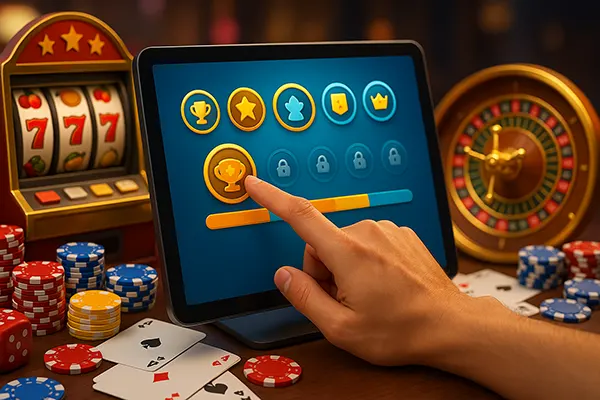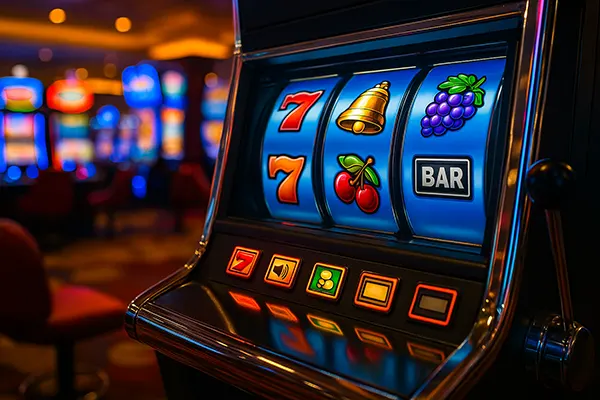Gamification in Casinos: How Achievement Systems Shape Player Behaviour

Gamification has become one of the most influential strategies in modern gambling. By integrating reward mechanisms, progress tracking, and social elements, online casinos have transformed traditional gaming into a more engaging experience. This approach not only enhances player satisfaction but also alters the way people interact with games, motivating them through goals and achievements rather than relying solely on chance.
The Psychology Behind Gamification
Gamification leverages psychological principles of motivation, such as the desire for achievement and recognition. When players receive badges, levels, or points, their brains release dopamine—a neurotransmitter linked to pleasure and reward. This reaction reinforces continued participation and encourages users to reach the next milestone. In 2025, this approach remains a key driver for player retention across both desktop and mobile casinos.
Achievement systems also tap into intrinsic motivation. Players enjoy mastering challenges and seeing tangible progress, which creates a deeper connection between them and the gaming process. The feeling of “growth” is particularly powerful, transforming routine play into a personal journey of skill development.
Furthermore, social competition strengthens engagement. Leaderboards and community rankings provide a sense of belonging and recognition. Players are not just chasing monetary rewards—they are competing for status, which adds an entirely new layer of emotional satisfaction.
Real-World Examples and Industry Implementation
Many operators have embraced gamification through loyalty missions, quest-based bonuses, and experience point (XP) systems. Brands like PlayOJO, Casumo, and LeoVegas have developed tiered progress schemes that encourage consistent play while maintaining responsible gambling standards. Players can unlock special bonuses or exclusive features as they advance, similar to level progression in video games.
Another innovative trend in 2025 is the integration of cross-platform achievements. A player’s progress is synchronised across desktop and mobile environments, providing a seamless experience. This continuity reinforces long-term engagement and builds trust, as users perceive the system as fair and transparent.
Developers such as NetEnt and Playtech also contribute to the evolution of gamified systems. Their slot releases now often include “achievement trackers,” rewarding players for hitting specific combinations or completing certain in-game challenges—adding depth to the gameplay without altering the core mechanics of chance.
Impact on Player Behaviour and Retention
Gamification significantly influences how users approach gambling. By introducing goals and structure, it reduces impulsive behaviour and transforms play into a more intentional activity. Players begin to focus on progress and skill rather than random wins, which contributes to longer but more controlled sessions.
In addition, gamified systems enhance brand loyalty. Research shows that users who engage with reward-based environments are more likely to return and interact regularly. This creates a sustainable model for both players and operators, where satisfaction is based on progress, not just luck.
However, it is essential for casino operators to balance gamification with responsibility. The line between motivation and compulsion can be thin, and ethical design must always prioritise player well-being. In 2025, many regulators, including those in the UK and Denmark, are introducing guidelines that require transparent display of progress indicators and time limits.
Responsible Design and Transparency
Modern achievement systems incorporate features that help users monitor their activity. For instance, real-time dashboards show session duration, wager amounts, and achievement milestones. This transparency fosters trust and enables players to maintain control over their gambling habits.
Some casinos also include self-limiting tools integrated into the gamified interface. Instead of encouraging excessive play, these tools remind users of responsible practices and even reward them for setting healthy limits. This aligns with current European responsible gaming frameworks and reflects the industry’s shift toward ethical engagement.
Transparency has also become a key factor for licensing bodies. Operators are now expected to disclose how rewards and achievements function, ensuring that players understand the odds and conditions tied to each milestone. This open communication strengthens credibility and aligns with E-E-A-T principles emphasising trust and authenticity.

Future Trends in Gamified Casino Systems
The future of gamification lies in customisation and artificial intelligence. AI-driven systems in 2025 are increasingly able to personalise challenges based on player behaviour and preferences. This means that every user can receive unique missions or achievements that match their playstyle, enhancing both engagement and fairness.
Virtual and augmented reality are also entering the scene, offering immersive environments where players can complete missions in visually dynamic spaces. These technologies are not just about aesthetics—they enable social collaboration and team-based challenges that reshape the concept of online gaming.
Finally, the integration of blockchain technology allows for transparent and verifiable tracking of achievements and rewards. Players can now view provably fair records of their milestones, adding a new layer of trust. This evolution signals a move toward more accountable, player-focused systems that combine entertainment with fairness.
The Role of Regulation and Ethics in 2025
Regulatory bodies such as the UK Gambling Commission and Spillemyndigheden in Denmark are closely monitoring how gamification influences player psychology. Their goal is to ensure that reward systems promote entertainment rather than addiction. New guidelines introduced in 2025 emphasise informed consent, data protection, and clear communication about how achievement-based incentives work.
Casinos that align with these ethical standards gain not only compliance but also public trust. In an industry often scrutinised for its social impact, transparency and player-first design have become vital competitive advantages. The future of gamification depends on maintaining this balance between innovation and integrity.
As the global gambling landscape continues to evolve, gamification remains one of its most transformative forces. When implemented responsibly, it empowers players to engage meaningfully, supporting sustainable entertainment that respects both enjoyment and personal boundaries.



